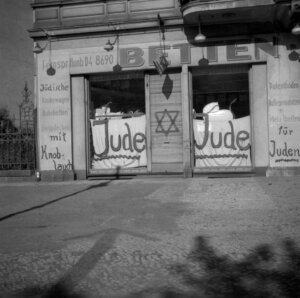Should we call the violence against Israeli soccer fans a ‘pogrom?’
There are disturbing parallels but also key differences between recent and historic acts of violent antisemitism

A jet plane with Israeli Foreign Minister Gideon Saar onboard lands at Schiphol Airport on Nov. 8, 2024 after the violent assaults on the streets of Amsterdam. Photo by Getty Images
When Israeli soccer fans were chased through the streets of Amsterdam and attacked Thursday night, some called it a “pogrom.”
“The mobs had been prepositioned at stadium exits, subway station entrances, and near and around the hotels at which Israelis who had come to town to support their team were staying,” John Podhoretz wrote in Commentary, in a piece titled “Pogrom 2024.”
“This was a pre-planned attack,” he continued. “We are mere days away from the 86th anniversary of Kristallnacht, the day when Jews and Jewish businesses were specifically targeted for arrest, injury and destruction. We’ve only ever really seen still photographs of the damage. You want to know what Kristallnacht was like? Go to Twitter and watch the videos, taken by the GoPro cameras of the goons, and you’ll get some flavor of what the word ‘pogrom’ means.”
Podhoretz’s choice of words — “prepositioned” and “pre-planned” — is important here. “Pogrom” is a Russian word that means “to wreak havoc, to demolish violently,” according to the U.S. Holocaust Museum.The Oxford English Dictionary goes with “devastation” in its pogrom definition. But the OED points out that organization is part of what a pogrom is. “An organized massacre of a particular ethnic group, in particular that of Jews in Russia or eastern Europe,” is how Oxford defines it.
The Merriam-Webster dictionary is more blatant. It defines pogrom as “an organized massacre of helpless people, specifically: such a massacre of Jews.”
The sheer number of attackers certainly felt reminiscent of prior eras. “The police in Amsterdam said that at least 62 people had been arrested in connection with attacks in the city, which unfolded over two tense days that saw people gather in support of the Israeli team while others protested its presence,” The New York Times reported. “The Dutch police said the violence included assaults on Israeli fans by people, some riding scooters, who kicked and beat them in ‘hit and runs.’”
The United States Holocaust Museum has a Holocaust Encyclopedia with more to say on what makes a pogrom a pogrom.
“Historically,” the encyclopedia states, “the term refers to violent attacks by local non-Jewish populations on Jews in the Russian Empire and in other countries. The first such incident to be labeled a pogrom is believed to be anti-Jewish rioting in Odessa in 1821. As a descriptive term, ‘pogrom’ came into common usage with extensive anti-Jewish riots that swept the southern and western provinces of the Russian Empire in 1881–1884, following the assassination of Tsar Alexander II.”
That word “local non-Jewish populations” is relevant to labeling this horrible assault in Amsterdam’s streets a “pogrom.”
It’s pretty clear from video and audio that these were Arab attackers, but were they “local?” I don’t think we know yet whether all the perpetrators lived in Amsterdam, or whether they, like the Israelis, came to Amsterdam from elsewhere.
And it’s hard to miss, as Israel’s Prime Minister Benjamin Netanyahu noted, that the Amsterdam incident happened just before the anniversary of Kristallnacht.
But in prior centuries, what made many Jews flee after pogroms is recognizing that not only were their neighbors attacking them, but the local government and police were not protecting them. And of course, in the case of the horrific Kristallnacht pogrom, the government organized and perpetrated the pogrom.

“The perpetrators of pogroms organized locally, sometimes with government and police encouragement,” the Holocaust Museum explains. “They raped and murdered their Jewish victims and looted their property. During the civil war that followed the 1917 Bolshevik Revolution, Ukrainian nationalists, Polish officials, and Red Army soldiers all engaged in pogrom-like violence in western Belorussia (Belarus) and Poland’s Galicia province (now West Ukraine), killing tens of thousands of Jews between 1918 and 1920.”
It’s important to note that the Amsterdam perpetrators were arrested, a far cry from what happened in Russia, or in Germany in 1938.
Was the Dutch government or police involved here? So far, no one has asserted this, though many on social media have accused the Dutch of not responding quickly enough. And former Prime Minister Naftali Bennett took to X, the platform formerly known as Twitter, to urge the Dutch to take action.
Whether this meets all the dictionary requirements of a pogrom or not, it’s pretty chilling to have to look up “pogrom” in 2024. And certainly, the Israeli government — and rabbinate — saw this incident as life-threatening. El Al will be flying free evacuation flights from Amsterdam to Tel Aviv this Shabbat, after both of Israel’s chief rabbis ruled that it could.
That Israeli citizens should have to be evacuated — on Shabbat — from the city that now has an Anne Frank Museum and from a country that is home to 40,000 Jews is disturbing enough, and it highlights both the vicious rise of antisemitism in Europe and the intense anti-Israel sentiment throughout much of the world.
There were 379 documented antisemitic incidents in The Netherlands in 2023, according to the Anti-Defamation League, a 245% increase over 2022, whose tally had also been an all-time high.
In the end, that matters a lot more than what the precise definition of a “pogrom” is.

















